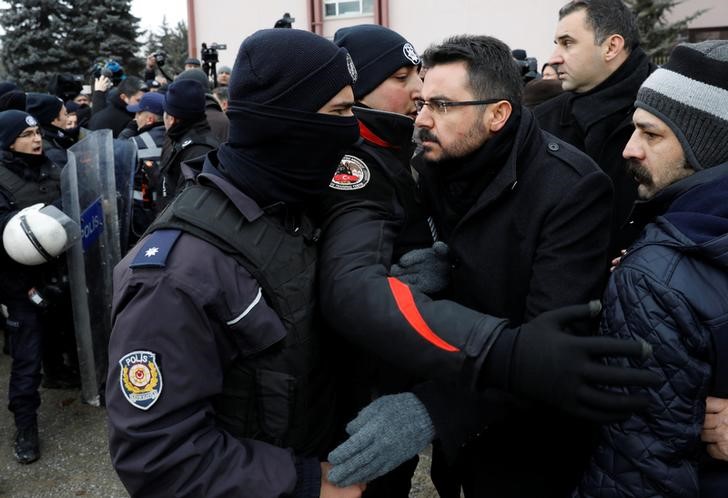Street Calls of the Week
(Bloomberg) -- A Turkish court set free U.S. Pastor Andrew Brunson after holding him in prison for almost two years, removing a key source of tension between Turkey and the United States.
The court in Izmir convicted Brunson, 50, an evangelical pastor from North Carolina, and sentenced him to three years, 1 month and 15 days in jail, but lifted all judicial controls and released him after accounting for penalty reductions and time served.
Brunson had been accused of collaborating with terrorist groups and participating in a 2016 coup attempt in Turkey. His prolonged imprisonment led the U.S. to impose sanctions on two Turkish ministers and threaten further penalties were he not released. His release will be seen as a political victory for President Donald Trump, who started his day on Twitter by saying he was “working very hard” on the Brunson case.
“It will be a victory, there is no question,” said Jonathan Schanzer, senior vice president at the Foundation for Defense of Democracies in Washington. “I’m wondering what the political cost may be.”
The lira pared gains and was little changed at 5.9256 per dollar at 2:05 p.m. in New York.
My thoughts and prayers are with Pastor Brunson, and we hope to have him safely back home soon!
— Donald J. Trump (@realDonaldTrump) October 12, 2018
Brunson had lived in the Aegean coastal city of Izmir for more than 20 years before being arrested on espionage charges in 2016 as part of a crackdown following the failed coup against President Recep Tayyip Erdogan. He was transferred to house arrest in July because of poor health, but U.S. officials had expected him to be freed at that time.
Brunson’s continued detention -- and Erdogan’s refusal to release him despite intense pressure from the White House -- was a significant factor in a precipitous decline in U.S.-Turkey relations in recent months. Furious over Turkey’s refusal to let him go, Trump in August doubled metal tariffs on Turkey and slapped sanctions on two senior Turkish officials involved in Brunson’s detention.
“I have just authorized a doubling of Tariffs on Steel and Aluminum with respect to Turkey as their currency, the Turkish Lira, slides rapidly downward against our very strong Dollar!” Trump wrote on Twitter on Aug. 10. “Aluminum will now be 20% and Steel 50%. Our relations with Turkey are not good at this time!”
Turkish officials had sought meetings with the U.S. to negotiate a resolution to the Brunson case and other issues, but in August National Security Adviser John Bolton declared no such talks would proceed until Brunson was let go. In the meantime Turkey’s lira continued its fall, losing about 25 percent of its value in August alone.
The White House made no concessions to Turkey to secure Brunson’s release, one U.S. official said. He’s expected to fly to a third country, possibly Germany, soon before returning to the U.S. It’s not clear whether or when the U.S. will drop sanctions imposed on Turkish officials in response to his detention.
Officials have hoped Brunson’s release could serve as a catalyst for improving ties between Turkey and the U.S. Turkey has played a role in the fight against Islamic State in neighboring Syria and has the second-biggest military in the North Atlantic Treaty Organization. At the same time, Erdogan has made American leaders increasingly nervous because of his drift toward authoritarianism and pursuit of better ties with Russia.
“While we are relieved by today’s decision on Pastor Brunson’s unjust detention, we remain concerned for the Turkish people," the U.S. Commission on International Religious Freedom said in a statement on Friday. “Turkey must continue to work to treat all of its citizens equally and with respect for their religious freedom."
The tensions over Brunson’s arrest had become a source of frustration and personal embarrassment for Trump, who believed Erdogan backed out of a deal in July to release him. Trump and Erdogan were seen at a July NATO summit in Brussels giving each other a fist bump, reportedly after working out a deal to free the pastor.
The issue had also been repeatedly highlighted by Vice President Mike Pence and Secretary of State Michael Pompeo, who serve as important links between Trump and his evangelical Christian base. In a tweet in August, Pence said U.S. sanctions “will continue until President Erdogan and the Turkish government release Pastor Brunson and return this innocent man of faith to the U.S.”
Brunson denied the charges against him, which included conspiring to help topple Erdogan and fanning ethnic tension. He was accused of contacting people linked to Fethullah Gulen, a prominent Turkish cleric living in exile in the U.S. whom Erdogan has blamed for the coup. Turkey has unsuccessfully pressed the U.S. to extradite Gulen, who denies involvement in the coup attempt.
Three other people detained in Turkey have further fueled strain between the U.S. and Turkey. They include NASA scientist Serkan Golge and three Turkish employees of the U.S. mission to Turkey. The U.S. says they’re innocent and being held by Turkey to extract concessions on other points of tension in the U.S.-relationship.
Those are only some of the obstacles to a sustained improvement in ties between the two nations.
“More serious issues including Turkey’s plans to purchase S-400 missiles from Russia and the U.S. support for Kurdish YPG forces in Syria are still dividing them,” Ercan Citlioglu, an analyst with Ankara-based Baskent University said by phone after the decision. Brunson’s release could, however, “offer a window of opportunity for both sides to sit down and iron out their differences on those issues.”
(Updates to add analyst’s comments starting in fourth paragraph and lira’s move in fifth paragraph.)
